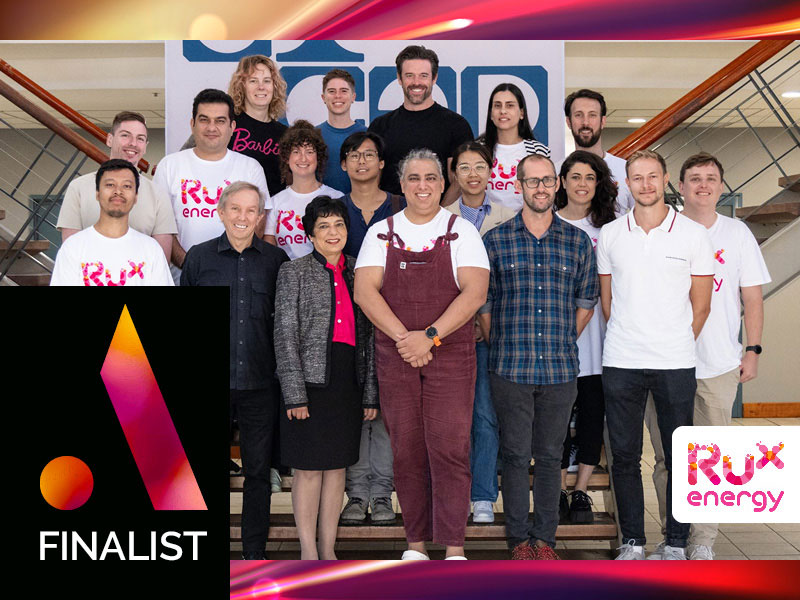The entire world is on a mission to decarbonise by at least 45 percent by 2030 to try to mitigate the catastrophic impacts of climate change.
A number of nations have identified hydrogen as being a key player in these efforts, particularly in assisting heavy industry with the energy transition.
But these efforts are currently being held back in part by storage issues, which are slowing the transition to more sustainable energies from some of the highest emitting sectors in the global economy.

The primary issues with the storage of hydrogen for heavy industry usage relate to efficiency and cost.
Dr Jehan Kanga, discovered advanced materials while completing a PhD at the University of Sydney, aims to overcome these two core issues and assist with the global clean energy revolution.
Dr Kanga has had a successful career at KPMG, and is now the chair of the $260 million Automation Composites Manufacturing Cooperative Research Centre.
These breakthrough nanoporous materials in next-generation carbon composites assist with advanced hydrogen storage, achieving significant step-changes in the efficiency, safety and cost of hydrogen storage.
This technology allows for the storage of near-liquid hydrogen densities at moderate conditions, with zero boil-off, in a way that is 10 times more energy efficient and far cheaper than the current offerings.
This would greatly assist with an underlying goal of shifting to a low-cost green hydrogen economy by the end of this decade, and with broader climate change-related efforts.
The technology has now been commercialised and Rux Energy formed, with a goal to reduce the cost of storage and distribution of hydrogen to $US1/kg H2 by 2030, representing a 10 times decrease.
Rux Energy is a finalist in the InnovationAus 2024 Awards for Excellence in the Translation Hero category. You can secure your tickets for the black-tie gala event here. The Translation Hero category is sponsored by CSIRO’s ON Innovation Program.
Rux Energy is targeting this tech breakthrough at the ships, trucks, trains, planes and heavy industry.
It is currently prototyping and testing this technology as part of international collaborative projects aimed at the decarbonisation of tug boats and port operations, along with shoreside power.
These systems will be designed so they are resilient and can eventually be deployed on the likes of crew transfer vessels, larger ships, trains and planes.
The method put forward by Rux Energy involves filling storage tanks with a highly porous nanomaterial — so porous, in fact, that just one gram of this material has the surface area equivalent to an entire football field.
These materials can then act like a sponge to absorb the hydrogen, without changing the hydrogen molecule itself at all.
“We’re not quite bending the laws of physics, but it is a bit like making the tanks bigger on the inside,” Dr Kanga said.
Earlier this year, the company signed a collaboration deal with Freeport East, which is one of 12 freeports in the United Kingdom, furthering Rux Energy’s goal of exporting its clean hydrogen technology around the world.
Rux Energy has also secured funding from the federal and NSW governments, along with support from Innovate UK and private venture funding.
The company is involved in end-to-end partnerships with a number of higher education institutions, including the University of Sydney, University of Suffolk and the National University of Singapore.
Looking for brand exposure in front of Australia’s tech ecosystem? Purchase a table of 10 for the InnovationAus 2024 Awards for Excellence and have your logo displayed on screens across the venue and in the event programme as a table sponsor.
The InnovationAus 2024 Awards for Excellence are supported by: Australian Computer Society, Investment NSW, Department of Industry, Science and Resources, Technology Council of Australia, TechnologyOne, National Artificial Intelligence Centre, CSIRO’s ON Innovation Program, Reason Group, Q-CTRL, University of New South Wales, and IP Australia.
Protecting your great ideas with intellectual property (IP) rights can lead to lasting benefits for your growing business. IP refers to creations of the mind, such as a brand, logo, invention, design or artistic work. Head to the IP Australia website to find out more about IP, and how it might help your business.
Do you know more? Contact James Riley via Email.
